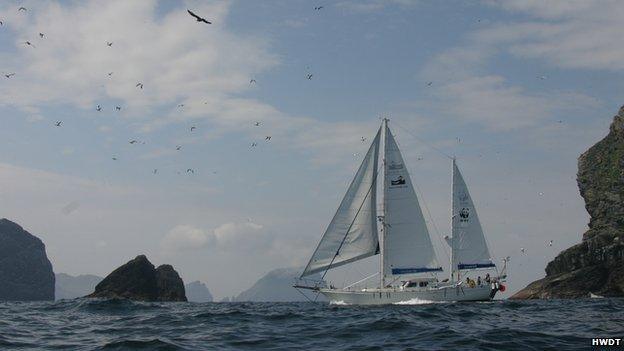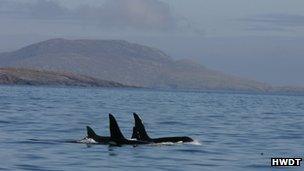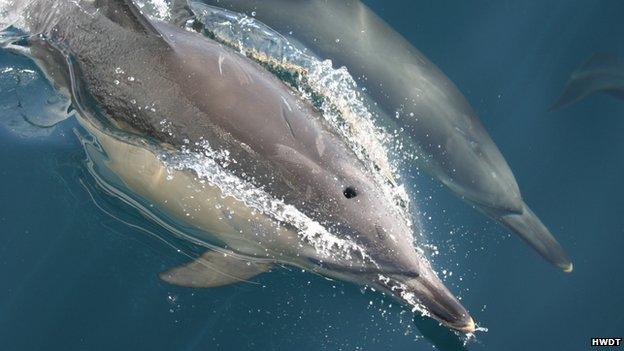West coast whales, dolphins and sharks to be surveyed
- Published

The survey work will be done from the Hebridean Whale and Dolphin Trust's yacht Silurian
Whales, dolphins and porpoises are to be photographed and their calls recorded during a new survey of marine life off Scotland's west coast.
Scientists and volunteers will gather the data between May and September.
The Hebridean Whale and Dolphin Trust (HWDT) project will also seek to record behaviour and numbers of basking sharks.
The survey work will be carried out over seven to 10 days from the charity's yacht, Silurian.
HWDT said 24 species of cetaceans - whales, dolphins and porpoises - can be found off Scotland's west coast, including species designated as national and international conservation priorities.
The survey will involve photographing dorsal fins for use in identifying individual animals and to improve understanding of species' movements and interactions.
Photo identification work has already catalogued 125 minke whales, some of which HWDT believe stay in Hebridean seas all year round.

The trust has previously raised concerns about a group of killer whales
The waters also support the UK's only resident population of killer whales and two feeding and breeding hotspots for basking sharks, the world's second biggest fish.
During the survey work, an underwater microphone called a hydrophone will be used to record the high frequency sounds of harbour porpoises and white-beaked dolphins for analysis.
Olivia Harries, HWDT biodiversity officer, said: "Given environmental and climate change, action to monitor and conserve Scotland's spectacular whales, dolphins and porpoises is more important than ever.
"With 2013 being the Year of Natural Scotland, we're keen for people to take part in our surveys."
Volunteers will have to pay a fee to join the survey trips.
Shark tagging
Earlier this year HWDT warned that the UK's only known resident population of killer whales was at risk of becoming extinct.
The group, which ranges from the north and west coast of Scotland to Ireland's west coast, is thought to contain just nine older animals.
The trust said the group was at risk as a result of the "skewed" demographics and its studies suggested the animals had become isolated from other groups in the north east Atlantic.

An underwater microphone will be used to record the calls of dolphins and porpoises
In February, a sighting of sperm whales off Scotland's north-west coast in winter was described as "extraordinary" by research charity Sea Watch.
Creel fishermen working between Loch Torridon and South Rona spotted the deep-diving whales.
Sea Watch said groups of sperm whales had been seen off Scotland in the summer, but it was unusual for them to be spotted at this time of year.
It said the change could be a sign of warming sea temperatures.
This year has also seen a basking shark tagging and tracking project, external extended.
In 2012, eight sharks were satellite tagged off Scotland's west coast and their travels could be followed online.
One of the sharks was tracked to the west coast of Portugal and another swam 1,864 miles (3,000km) to the Canary Islands off west Africa.
Scottish Natural Heritage (SNH) and the University of Exeter plan to tag 29 sharks this summer.
The project aims to increase understanding of the behaviour of the fish which gather in large numbers around the islands of Coll, Tiree and Canna every summer.
The work is also part of a wider programme of marine research led by SNH and Scottish government agency Marine Scotland.
- Published14 March 2013
- Published11 March 2013
- Published21 February 2013
- Published9 January 2013
- Published24 September 2011
- Published3 December 2012